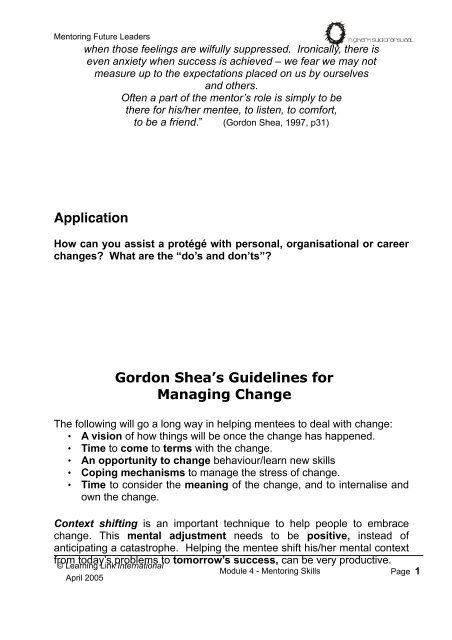Mentoring Future Leaders
Create successful ePaper yourself
Turn your PDF publications into a flip-book with our unique Google optimized e-Paper software.
<strong>Mentoring</strong> <strong>Future</strong> <strong>Leaders</strong><br />
when those feelings are wilfully suppressed. Ironically, there is <strong> </strong><br />
even anxiety when success is achieved – we fear we may not <strong> </strong><br />
measure up to the expectations placed on us by ourselves <strong> </strong><br />
and others.<br />
Often a part of the mentor’s role is simply to be <strong> </strong><br />
there for his/her mentee, to listen, to comfort, <strong> </strong><br />
to be a friend.” (Gordon Shea, 1997, p31)<br />
Application<br />
How can you assist a protégé with personal, organisational or career<br />
changes? What are the “do’s and don’ts”?<br />
© Learning Link International<strong> </strong><br />
April 2005<br />
Gordon Shea’s Guidelines for <strong> </strong><br />
Managing Change<br />
The following will go a long way in helping mentees to deal with change:<br />
• A vision of how things will be once the change has happened.<br />
• Time to come to terms with the change.<br />
• An opportunity to change behaviour/learn new skills<br />
• Coping mechanisms to manage the stress of change.<br />
• Time to consider the meaning of the change, and to internalise and<br />
own the change.<br />
Context shifting is an important technique to help people to embrace<br />
change. This mental adjustment needs to be positive, instead of<br />
anticipating a catastrophe. Helping the mentee shift his/her mental context<br />
from today’s problems to tomorrow’s success, can be very productive.<br />
Module 4 - <strong>Mentoring</strong> Skills Page ! 1




